Clash Over T runk Services
Page 26

If you've noticed an error in this article please click here to report it so we can fix it.
THE first post-nationalization clash before the Transport Tribunal between the British Transport Commission and private enterprise over trunk services occurred last week. The B.T.C. appealed against the grant to S. J. Meads Transport, Ltd., Earl Road, Bermondsey, of a B licence for two vehicles by the Metropolitan Deputy Licensing Authority.
The hearing was adjourned because Mr. N. L. Macaskie, Q.C., a member of the Tribunal, was ill.
Mr. C. R. Beddington, for the B.T.C., said that it was Meads' first application for a B licence. At the time of the inquiry last November they held an A licence issued in 1949 for two vehicles for general traffic in and around London.
On March 1, 1954, they bought 16 vehicles from the B.T.C., 15 of which were on special A licences. Since that date the concern had successfully operated trunk services between London and Manchester and London and Birmingham. Ten of the vehicles were used on trunk services and five for general activities. The two A-licence vehicles were put on collection and delivery work in London.
Mr. Beddington said that the company's case was that the change in the organization of their traffic resulted in some inconvenience to established customers. He submitted that thee was no reliable evidence of traffic requiring collection and delivery, nor of its quantity. There was also no evidence about inconvenience to customers.
The need for direct control of collection and delivery had not been shown. The B.T.C. had proved that they could either carry the traffic the whole distance, or could provide collection and delivery services.
Mr. D. L. McDonnell, for Meads, said that the company's case was that as a result of their difficulty in arranging distribution in London, they used vehicles already in possession but engaged upon other work. Old customers had been neglected.
























































































